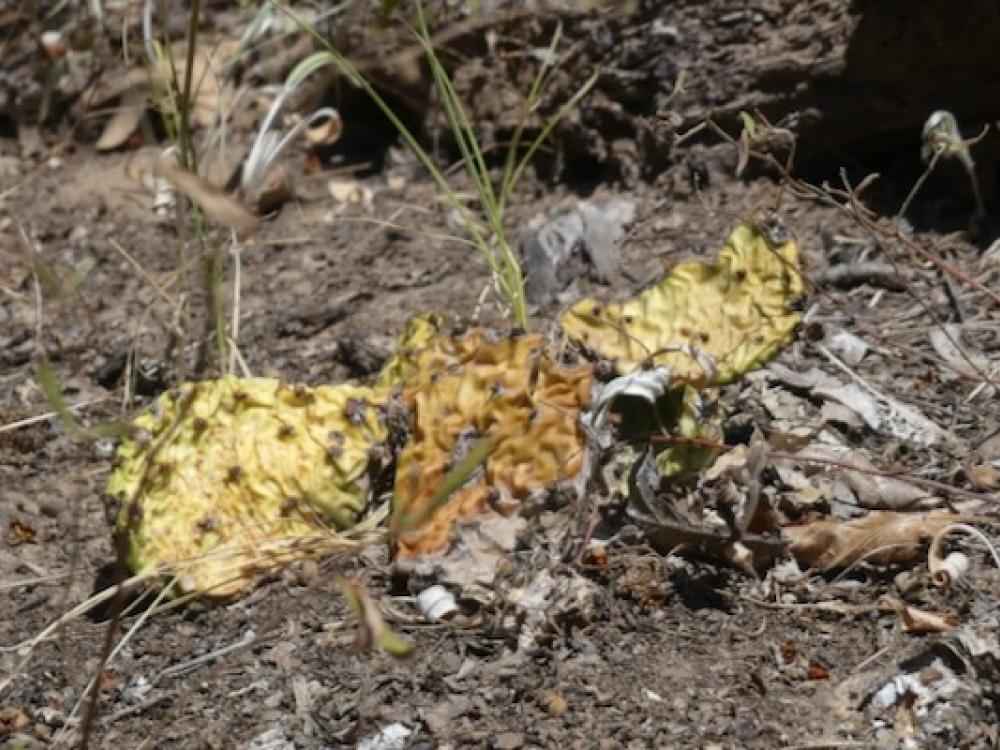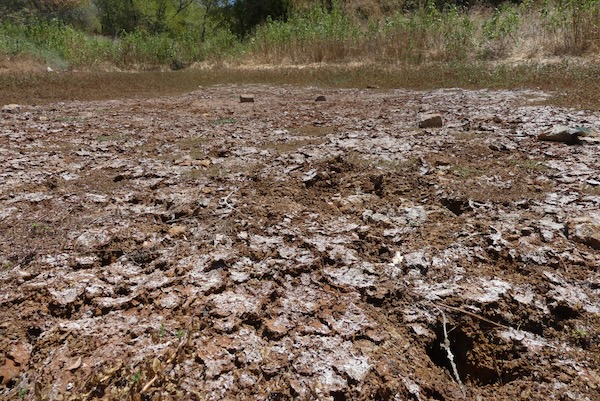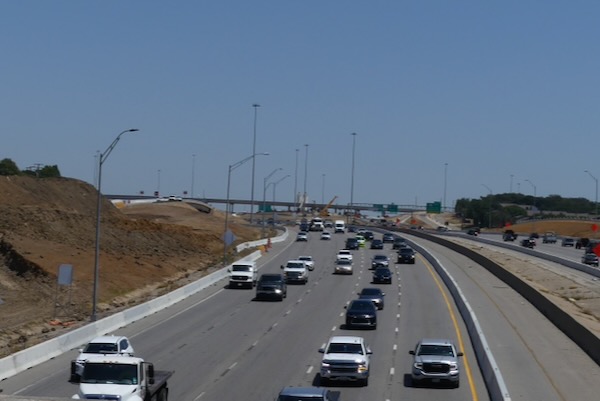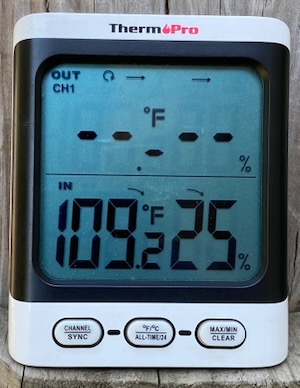
In prolonged heat and drought, prickly pear cactus can become stressed and shriveled or even die. Photo by Michael Smith.
Aug. 17, 2023
On a recent day in August, I stepped outside into my Arlington back yard and it felt like a toaster oven. At 6:30 p.m., the temperature was still 106 degrees. The heat index, which factors in humidity, made it feel like 111.
On that day, the National Weather Service reported that in Dallas-Fort Worth, we were up to 19 consecutive days at or above 100 with at least three more to come.
We expect Texas summers to be hot. Most of us try to take it in stride. But by mid-July, forecasters were already saying this summer was one of the hottest on record.
While some mornings have been tolerable, venturing outside in the afternoons has been challenging (and potentially unsafe).
Meanwhile, headlines have been filled with heat-related tragedies, such as frequent wildfires, including the recent Maui fire, the deadliest in the U.S. in 100 years. In Arizonia, pedestrians were getting burned from hot pavement. Other weather extremes, such as storms and floods, make it clear that today’s world —and today’s climate — is different.
And so we get outside in the mornings, if at all, and we miss out on summer activities — fun that used to make summer a favorite time of the year. But for those without housing and those who have to work outside, the summer of 2023 is a nightmare. Adding to our own discomfort, we watch creeks and ponds dry up and trees become stressed or die, as if nature itself were dying. Many of us feel trapped inside our homes. One person I spoke with said that for her, it was like a return to Covid shutdown.
 A dried-up pond at Sheri Capehart Nature Preserve in Arlington. Photo by Michael Smith.
A dried-up pond at Sheri Capehart Nature Preserve in Arlington. Photo by Michael Smith.
HOW ARE WE COPING?
I talked with several people struggling to get through this summer.
“Sunset is a relief,” one commented. “The blaring sun feels invasive.”
She said she feels drained of energy, with sadness and a sense of loss because of damage to nature and the climate.
“Grief is never far away — we’re going in the wrong direction,” she said, in terms of how we care for our environment.
Another woman, Janice (names have been changed for privacy) experiences loss and anxiety. She feels fear in the pit of her stomach.
“Everything’s on fire,” she said. “[The feeling] is like going down the first hill of a roller coaster.”
Having to live in a house that doesn’t shut out the heat, she said the house is too hot for her to get to sleep before about 3:00 a.m. Then she has to get the kids off to school and begin work the next morning.
“There’s so much uncertainty,” she said. “I don’t want to be a climate refugee.”
For Kristen, the sense of loss — of places in nature and of a stable and healthy climate — is one of the most profound issues she is facing. She feels boxed indoors.
“I am being robbed of restorative experiences in nature, and so are my children,” she said.
More concrete adds to the urban "heat island" effect, making cities warmer than surrounding areas. Photo by Michael Smith.
Her kids are at the age when a strong relationship with nature is usually forged, but some of those dreams are dissolving with each passing year.
“As they get older, it really makes me sad.”
A therapist friend commented, “All my clients are struggling.”
Researchers have found that excessive heat is associated with an increase in suicides, violent crime and aggression. High temperatures are also linked to more emergency room visits for mental disorders. That does not mean that heat causes such things as suicide or mental illness, but it makes it harder to cope with everything else and raises our risk of problems with mood and behavior.
One way that heat may act as a stressor is by interfering with sleep, as is happening to Janice. In an excessively warm room, people fall asleep later and awaken earlier, and the quality of sleep suffers. Each of us can relate to how lack of sleep makes us function more poorly in a variety of ways.
One of our body’s primary ways of coping with heat is to use water and salt to produce sweat. As the sweat evaporates, it cools our skin. But when we continue sweating in attempt to cool ourselves from excessive heat, we may become dehydrated and lose electrolytes (those minerals — like salt — in our fluids). That can interfere with kidney function, cardiac health and other things. And of course, exposure to excessive heat can lead to heat exhaustion or heat stroke.
IT'S MORE THAN JUST THE TEMPERATURE
 Photo by Michael Smith.
Photo by Michael Smith.
There’s more here than just heat as a stressor. There is also the worry about what we are facing in a world with an increasingly damaged climate. There are predictions that parts of the world may become too hot for people to inhabit. Additionally, the unstable weather patterns, freak storms and wildfires will make life more difficult.
In past years, the world (outside of human affairs) mostly conveyed a reassuring sense of predictability and nurturing, but a changing climate led Bill McKibben to write that we now live on a new and altered planet, one that he called “Eaarth” (also the title of his 2010 book).
Worrying about something can represent healthy awareness and can motivate action, but many of us experience more than worry. The Yale Program on Climate Change Communication reports that 9 percent of Americans report feeling down, depressed or hopeless for at least several days out of the last two weeks because of global warming. And 8 percent say that they are, or would be interested in, talking with a counselor about these feelings.
The Yale Program on Climate Change Communication reports that 9 percent of Americans report feeling down, depressed or hopeless for at least several days out of the last two weeks because of global warming.
Mental health experts are working on how best to understand —and help with — this anxiety, depression and grief. If I am depressed about the loss of predictability in the world around me, the loss of places that are being harmed, what the world will be like for my kids, and the stress of excessive heat, some of the usual therapies may need fine-tuning in order to help.
A cognitive therapist would look for fallacies and distortions in the way I think about the world, but what if the way I’m seeing the world is troubling but also realistic?
A person who has lost their home to a wildfire may struggle with repeatedly expecting another fire, having recurrent nightmares and obsessively watching fire conditions. Is that the residue of trauma or is it understanding new levels of fire risk (or both)?
Cecily Rodgers, a Licensed Professional Counselor in Colleyville, said that her clients don't talk about these issues very often.
“I specialize in working with Highly Sensitive Clients and these types of folks are generally deeply in tune with nature and the environment.” However, the things that bring them in to therapy may be more immediate and personal. If climate and loss of nature are contributing factors, they may be buried in the background. Others might be reluctant to bring up environmental grief and anxiety without knowing if a therapist will really “get it” about the significance of such issues.
Rodgers said, “I think we too often don't have a place to discuss these things and that is unfortunate.”
For those interested in an online place to discuss grief and uncertainty about these things, there is the Good Grief Network, a U.S. nonprofit that brings people together to, as the website states, “metabolize collective grief, eco-distress and other heavy emotions that arise in response to daunting planetary crises.”
Therapists know how to address anxiety, depression, and the like, but they may have limited experience when nature and climate play a significant part in the problems. The Climate Psychology Alliance-North America is working on training and supporting climate-aware therapists. And they have a directory of such therapists, although it is in its early stages; currently there are only two listings within 100 miles of Arlington.
WHAT CAN WE DO?
We cannot make the heat and drought go away, but there are things that we can do to take care of our bodies and minds. Here are some things that may help with mental wellness:
• Talk, journal, draw and practice other forms of self-expression. Find like-minded people and talk about sadness, worries and fears. Most things are easier to carry if shared. Find other ways to express yourself, such as journaling or drawing.
• Practice mindfulness and finding beauty. Mindfulness involves keeping an awareness of the present moment, with an attitude of acceptance. It may help us untangle ourselves from our thoughts and emotions. Finding moments of beauty — in clouds, in a view of a prairie or in birdsong — remind us of the good that still exists. I have been visiting a nearby nature preserve in the mornings when it is cooler, getting a chance to practice mindfulness, find beauty and write in a journal.
• Accept the uncertainty. This is related to mindfulness. Although uncertainty is hard to live with, finding appropriate ways to let go will often help more than trying to control the uncontrollable. That does not mean being passive or doing nothing. It means finding what we can do without struggling to have an impossible degree of control and certainty.
• Engage and take action. Find something you can do that is meaningful for you. Fight the sense of powerlessness that we too easily feel with a problem this big and systemic. A wise friend shared a story of a hummingbird fighting a forest fire. Despite overwhelming odds, the bird continued to carry drops of water to the fire – “I’m doing the best I can.” That’s always worth doing, regardless of the odds.
• Find a therapist. If you have depression, anxiety, grief, trauma and some or most of that is related to losing a dependable, nurturing climate, find a therapist who takes such things seriously and listens well.
We will get through this summer, and perhaps be better prepared for the next one. And each of us can keep “doing the best we can.”
RELATED ARTICLES
Recorded cases of heat illness spike during Texas heat wave
Young trees need help during heat wave
Trees need watering during Texas drought
'Put water out for wildlife,' urge North Texas rehabbers
Hummingbirds seek ‘filling’ stations to offset drought's damage
Stay up to date on everything green in North Texas, including the latest news and events! Sign up for the weekly Green Source DFW Newsletter! Follow us on Facebook,Twitter and Instagram. Also check out our podcast The Texas Green Report, available on your favorite podcast app.









